Chances are, if you’re a cat owner, you’ve experienced this perplexing phenomenon: you’ve just cleaned out the litter box, only to watch your beloved feline promptly take a swift dive, indulging in a luxurious roll.
It’s an intriguing sight, isn’t it? But why does your cat roll in the litter box?
When your cat rolls in the litter box, it’s more than an amusing spectacle. While seemingly bizarre, this behavior can raise several potential concerns or even simple curiosities.
Why on earth would our clean-loving feline friends partake in such a ‘mucky’ activity?
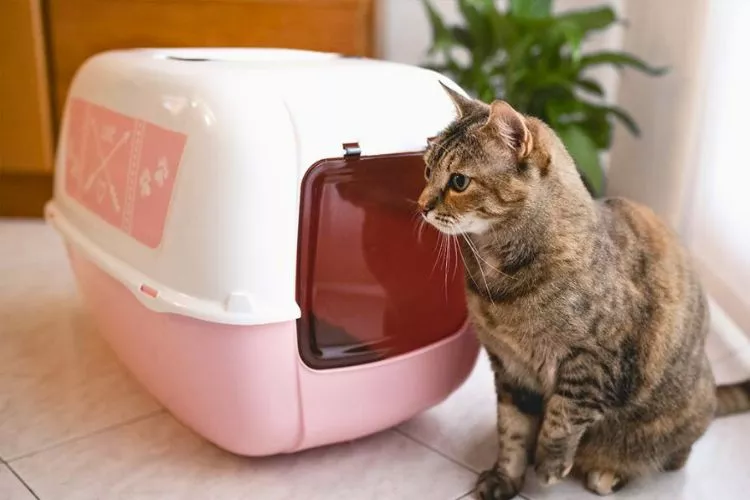
In short, a cat may roll in the litter box for various reasons such as scent-marking, seeking attention, medical issues, or feeling anxious or stressed.
Understanding the underlying cause can help address any potential concerns and improve your cat’s well-being.
🐾 Why Does Cat Roll in the Litter Box?
Cats rolling in their litter box might seem unusual to their human companions. Several potential reasons like scent-marking, attention seeking, anxiety, medical reasons etc. could explain why cats exhibit this behavior.
Each brings its own unique set of implications for how we take care of our feline friends.
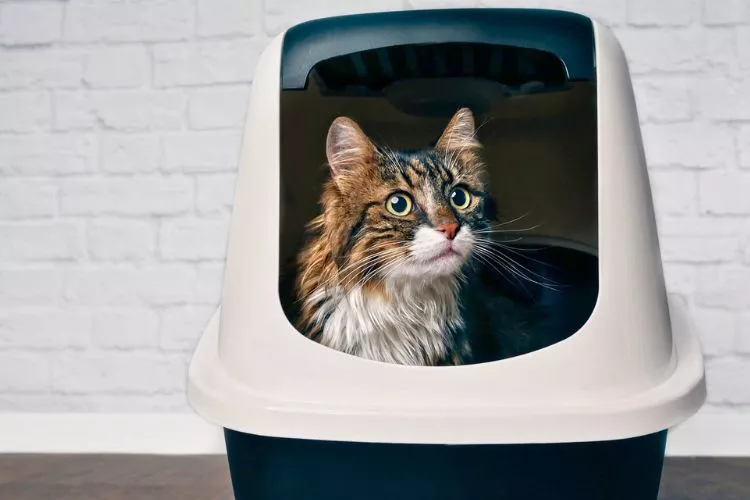
Scent-Marking
Cats are territorial creatures by nature, and their scent plays an integral role in marking their territory.
When your cat rolls in the litter box, it could be an attempt to mix their scent with their waste, asserting their territory and sending a potential message to any other cats that may be present in the household.
Seeking Attention
Sometimes, cats roll in their litter box to grab their owner’s attention. If your cat is doing this more frequently, especially when you’re around, they might be trying to interact with you.
This behavior could indicate that they want more playtime or another form of attention from you.
Medical Issues
Although less common, another reason that might cause a cat to roll in its litter box is the presence of medical issues. Skin conditions, fleas, or other parasites could cause your feline friend discomfort, leading them to roll in the litter to alleviate their itchiness.
Additionally, the cool litter might feel comforting if they feel sick or nauseous. A visit to the vet is always recommended for any health concerns.
Anxiety or Stress
Changes in a cat’s environment can cause stress or anxiety, triggering unusual behaviors like rolling in the litter box. It could account for this behavior if you’ve recently moved house, introduced a new pet, or made any significant changes.
If this is the case, helping them find ways to feel safe and comfortable again can alleviate their stress.
In conclusion, while it might initially seem odd, several explanations exist for why a cat might roll in its litter box. Understanding the causes can help us better interact with and care for our beloved feline friends.
🐾 How do I stop my cat from rolling in the litter box?
Stopping your cat from rolling in the litter box may require a combination of methods, depending on the underlying causes of the behavior.
Here’s a step-by-step guide to help you address and prevent this activity.
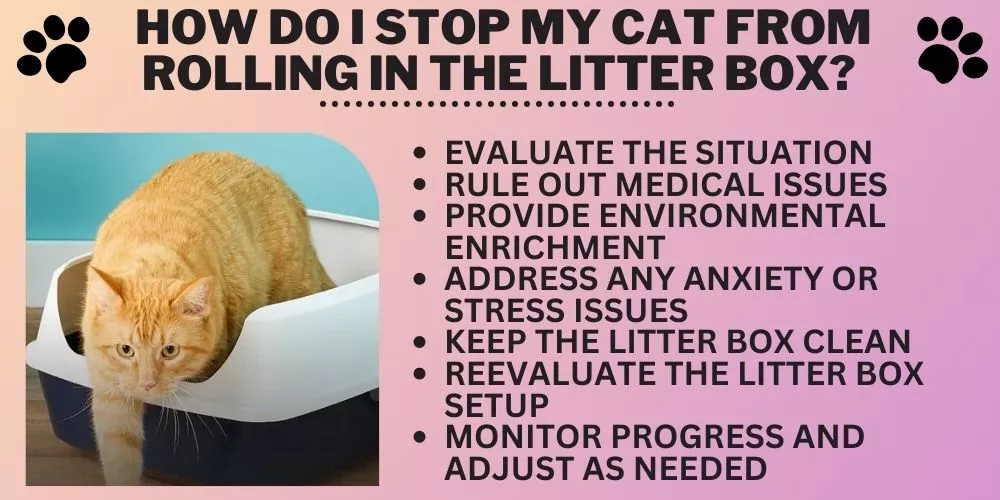
Step 1: Evaluate the Situation
Observe your cat’s behavior to identify patterns or possible triggers associated with rolling in the litter box.
- When does it happen?
- Is the cat alone during these moments?
- Are there any signs of anxiety or distress?
- Have there been any recent changes in the cat’s environment or routine?
Keeping track of these details can help pinpoint the reasons behind the action.
Step 2: Rule Out Medical Issues
Visit a veterinarian to ensure no underlying medical issues or discomforts causing your cat to roll in the litter.
- Discuss any skin irritations or signs of itchiness
- Check for fleas or other parasites
- Mention any other strange behaviors or signs of illness
If a medical issue is identified, follow the veterinarian’s recommendations to address the problem. Once resolved, your cat may stop rolling in the litter box.
Step 3: Provide Environmental Enrichment
In case your cat is rolling in the litter box out of boredom or seeking attention, it might help to:
- Increase interactive playtime
- Provide more toys, puzzle feeders, or other engaging activities
- Allocate specific times for petting and bonding
Ensuring your cat’s environment is stimulating and entertaining can minimize undesired attention-seeking behaviors.
Step 4: Address Any Anxiety or Stress Issues
Identify and resolve any elements that might contribute to your cat’s stress. You can:
- Create a consistent daily routine
- Provide hiding spots or perches for resting and observing
- Use pheromone diffusers or sprays to help calm your cat
- Introduce any new pets or household members gradually and with positive associations
By reducing stress and creating a comfortable environment, your cat will likely feel more secure and less likely to roll in the litter box.
Step 5: Keep the Litter Box Clean
Maintain clean litter box conditions by:
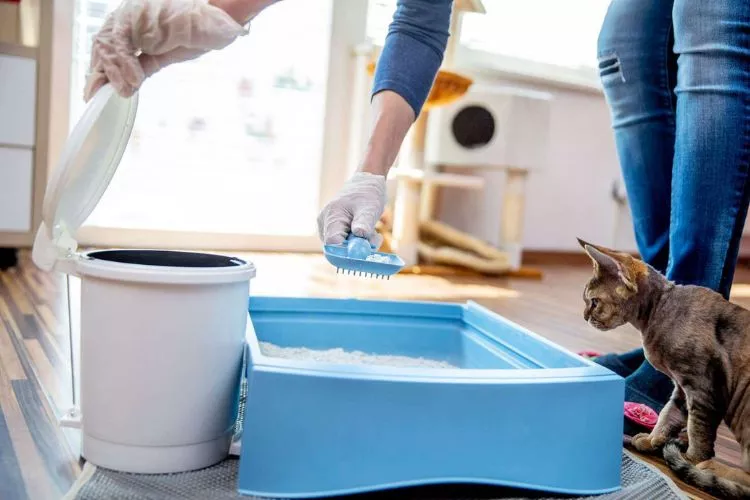
- Scooping out waste daily
- Replacing the litter entirely at least once a week
- Washing the litter box with warm soapy water weekly or biweekly
- Using good-quality, low-dust cat litter
A cleaner litter box might discourage rolling since your cat will have fewer waste odours to mingle with their scent.
Step 6: Reevaluate the Litter Box Setup
Consider changing the litter box setup to one that discourages rolling:
- Opt for a covered litter box (if it doesn’t stress your cat)
- Use a larger or deeper litter box to limit the rolling space
- Experiment with different types of litter (be sure to introduce them gradually)
- Place a mat or rug near the litter box to encourage rolling there instead
Experiment with the ideal setup to deter your cat from rolling in the litter box.
Step 7: Monitor Progress and Adjust as Needed
After implementing these steps, observe your cat’s behavior and monitor any progress. If your cat continues to roll in the litter box, reevaluate the situation and adjust accordingly, or consult a professional cat behaviorist for guidance.
By following this guide and understanding the root cause of the behavior, you can effectively discourage your cat from rolling in the litter box while promoting a healthier, happier environment.
🐾 Is it normal for cats to play in their litter box?
While it’s uncommon for cats to play in their litter box, occasional playing, digging, or rolling in the litter can occasionally occur, particularly with kittens who may still be exploring their surroundings and interpreting the box as a play area.
However, frequent playing in the litter box could indicate boredom, insufficient environmental enrichment, or even stress.
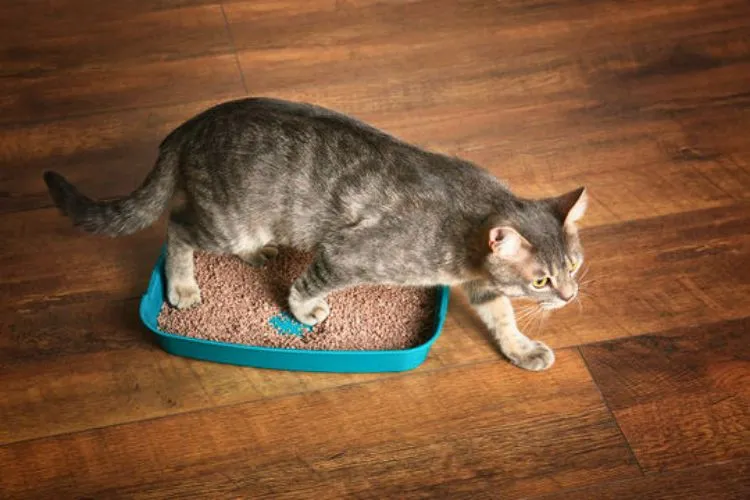
Suppose your cat continues to play in the litter box. In that case, evaluating their environment is essential and ensuring they have enough physical and mental stimulation through play, toys, and quality interaction time.
Also, maintain the cleanliness of the litter box and ensure there aren’t any medical issues causing this behavior. If the behavior persists, you may want to consult a veterinarian or cat behaviorist for further guidance.
🐾 How do I know if my cat likes her litter box?
Several signs indicate whether your cat is satisfied with their litter box setup. These include:
- Consistent usage: Your cat regularly uses the litter box without any accidents outside of it.
- No avoidance behavior: If your cat approaches and enters the litter box without hesitation, it suggests they’re comfortable with it.
- Stress-free demeanor near the box: A cat that feels secure around their litter box will appear relaxed and calm in its presence.
- No excessive digging: While covering waste is a natural behavior, cats that like their litter box will not spend excessive time digging or burying their waste.
- No unusual behavior while using the box: A cat that’s comfortable with their litter box will display typical elimination behavior, such as squats without straining, when using it.
Consider reevaluating the setup and making adjustments if your cat shows any signs of dissatisfaction, such as avoiding the litter box, eliminating outside of it, or demonstrating stress near the box.
This may include trying a different type of litter, offering a larger or covered box, or providing multiple litter boxes for multi-cat households.
🐾 frequently asked question (FAQs)
Yes, cats generally prefer a clean litter box. Cats are very clean creatures and derive comfort from cleanly spaces. A clean litter box reduces odors and makes the space more inviting for the cat, reducing the risk of accidents outside the box.
Yes, cats can recognize their litter box. Cats have a strong sense of smell and can recognize the scents in their litter box, which helps them identify it as their territory.
Not all cats hate automatic litter boxes. Some cats may initially be nervous or wary of the unfamiliar noise and movement generated by the automatic cleaning process. However, others may adapt quickly and appreciate the cleaner environment these devices maintain.
Cats typically do not cry when their litter box is dirty. Instead, they may exhibit avoidance behaviors, such as using another spot for elimination, digging excessively, or showing signs of unease. Sometimes, a cat may meow more or appear agitated if the litter box condition is unsatisfactory, but this can vary widely between individual cats.
Conclusion :
Understanding why your cat rolls in the litter box is crucial to effectively addressing this behaviour. It’s essential to consider potential factors such as scent-marking, attention-seeking, medical issues, stress, and anxiety.
By closely observing your feline friend’s behaviors and making the necessary adjustments to their living conditions and environment, you can create a comfortable space that discourages rolling in the litter box while promoting a happy, healthier relationship between you and your cat.
Don’t hesitate to seek guidance from a veterinarian or a cat behaviorist if you have concerns about your cat’s activity or if problems persist, as they can offer expert advice and help you ensure your pet’s well-being.
